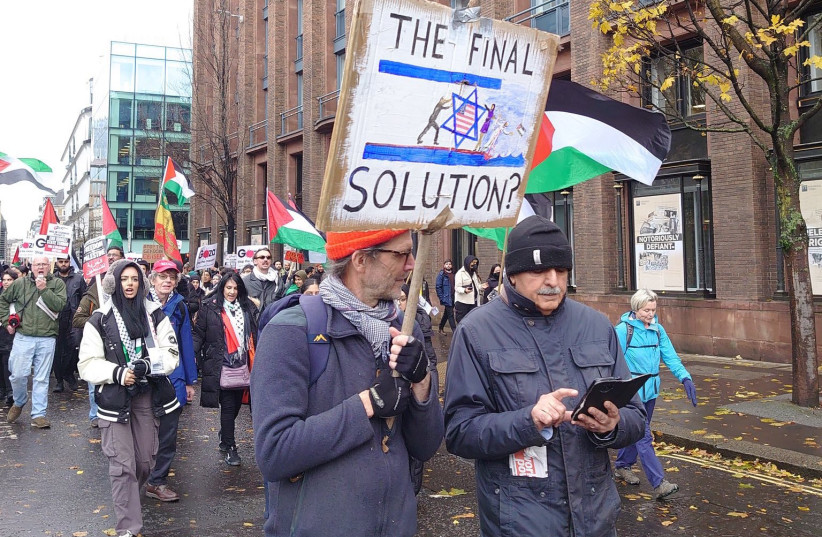In 1240, King Louis IX of France arranged for a “disputation,” a debate, to “disprove and malign” Judaism and Jewish thought. On one side were four of the most distinguished rabbis of France – Yechiel of Paris, Moses of Courcy, Judah of Melun, and Samuel Ben Solomon of Château-Thierry. On the other was Nicholas Donin, a Franciscan monk. Donin, who was not born a Christian, had converted from Judaism.
During the two hundred years that followed, there were two other such debates, one in Barcelona in 1263 and another Tortosa in 1414. In both cases, representing the church were Jewish converts to Christianity.
At the time, there were genuinely great Christian theologians, such as Francis of Assisi, Thomas Aquinas, and, later on, John Hus, who could have represented the Christian side in the debates. Yet, in all cases, the person who “volunteered” to “dispute” – to denounce Judaism – was, like Donin, a convert from Judaism.
Nicholas Donin and his relation to Israel post-October 7
I was thinking about Nicholas Donin after reading articles by Peter Beinart, Naomi Klein, Rabbi Alyssa Wise, and Max Blumenthal about Zionism and Israel post-October 7.
One can certainly criticize the actions and policies of the Israeli government – I and many others frequently do. But what leads Jews of all people to be the most vociferous critics of Israel’s very right to exist? Why do they, of all people, feel the burning need to lead the charge against the Jewish right to self-determination? Why try to “disprove and malign” Zionism?

The phenomenon of Jewish self-flagellation is complex, and as the disputations show, has a long history. Social psychologists have claimed that the persecution, discrimination, and marginalization that Jews have faced for millennia have led some to internalize the negative perceptions propagated by the broader society.
This internalized antisemitism has contributed to feelings of shame, guilt, or self-loathing, a sense of inferiority or self-doubt due to societal pressures or traumatic experiences related to Jewish identity. Historians have noted that Jews in the Middle Ages converted not only due to the persecution and violence of the Inquisition but also as a result of being socially ostracized, hoping conversion would mean gaining acceptance.
But why, after the worst massacre of Jews since the Holocaust, is Jewish self-flagellation raising its ugly head?
OUR HISTORY of persecution also led many Jews in the last century to align with social justice movements. These movements were initially motivated by the very valid objective of fighting the rights we all expect in a liberal democracy.
However, the extreme Left has transfigured social justice into a “religion of intersectionality” – the claimed interconnected nature of social categorizations such as race, class, gender, and sexuality, excluding and even invalidating the narratives of anyone not falling within their definition of the oppressed.
In the world of intersectionality, Zionism is presented as another form of white European nationalism and the Jewish right to self-determination is characterized as colonialism.
The intersectionalist has rewritten history to deny 3,300 years of continuous Jewish presence and spiritual connection with the Land of Israel, let alone the fact that over 50% of Israel’s population is comprised of Jews from Arab countries who were brutally persecuted and became refugees absorbed by the State of Israel. Palestinians are characterized as the oppressed – the indigenous people of color – and Jews the white European invaders.
Deviating from the narrative of “intersectionality” in the Israeli-Palestinian conflict means that one is subject to the 21st century’s form of “inquisition,” resulting in being unceremoniously dumped from the social justice camp. Instead of being tried in the courts of Paris, Barcelona, and Tortosa, today’s disputations take place in The New York Times, The Guardian, and on the grounds of Columbia University.
As in the Middle Ages, certain Jews still crave a certain kind of “acceptance” – in this case the acceptance that only being part of the intersectional movement can provide.
Why?
FIRST, THERE is the “survivor’s guilt” of being part of a very successfully acculturated minority in Western countries while other minorities continue to lag.
If we were part of, or even lead social justice movements, how is it possible that we were successful, and other minorities were not? It must be our fault because we must have done too little and now need to deny our own right to self-determination because others failed in theirs. If another Jew acts in a way inconsistent with the views of the movement, we must feel “collective guilt” and publicly make amends for the perceived harm done.
Second, as during the Middle Ages, there is the “peer pressure” to be part of the new religion – the desire for acceptance by others compels Jews to distance themselves from a fundamental part of their own Jewish identity, the connection to the Land of Israel, and to denounce Zionism.
That is why the people who shut down the Capitol and will try to do a public demonstration of bringing food to Gaza have been screamingly silent about the massacre by Syrian President Bashar Assad of hundreds of thousands of his people, the persecution and murder of millions by Islamic fundamentalists in Nigeria, and the slaughter of tens of thousands of Uyghurs in China.
The disputations of the Middle Ages had far-reaching consequences. Similar to today, they served as platforms for the propagation of antisemitic myths and blood libels, such as the intentional killing of children and the harvesting of organs. Similar to today, Jews faced threats of violence or other forms of persecution if they did not acquiesce to the arguments presented by their counterparts. Similar to today, they demonized Jews and justified their persecution.
Karl Marx once said that “history repeats itself, first as a tragedy, then as a farce.” Unfortunately, in the current repetition of history, the farce of the modern Nicholas Donins is the tragedy of our people.
The writer is an Israeli venture capitalist and nonprofit leader.
